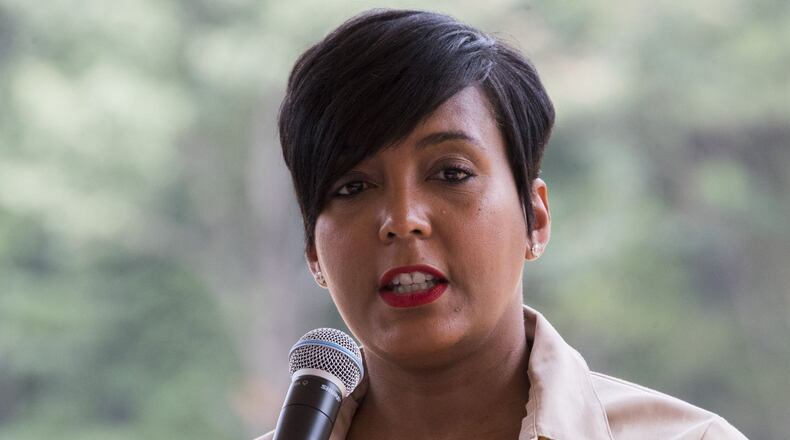As the city of Atlanta is still deciding what to do with its jail, Mayor Keisha Lance Bottoms has met with potential funders that could back a planned redesign or repurposing for the Atlanta City Detention Center.
Efforts to close the jail and find a new use for the building have been in the works since summer when City Council approved a task force to decide its fate. That could mean keeping it to do minor upgrades, renovating it, or demolishing it all together to make way for a new development.
Those preliminary recommendations were presented to attendees at the Atlanta City Jail task force meeting on Tuesday.
Bottoms has not made a specific monetary commitment to repurposing the jail, but she has met with people and groups interested in the project that could also fund it, the mayor’s senior adviser Rashad Taylor said at the meeting.
Taylor said one of those groups is criminal justice reform nonprofit Reform Alliance. Founded in 2018 by rapper Meek Mill, the nonprofit’s partners include rapper Jay-Z, New England Patriots owner Robert Kraft, and billionaire investor Robert Smith.
“We’re really looking outside the state’s borders to fund this project,” Taylor said.
No firm costs have been set while the task force is still working on proposals to send to Bottoms. Those proposals would have been due by Feb. 25, but the deadline has been extended to get more resident input.
So far, the task force has spoken to 50 organizations in Atlanta and held three town halls centered on youth, LGBTQ people and formerly incarcerated people.
RELATED COVERAGE:
The group has been working with Oakland-based real estate company, Designing Justice+Designing Spaces, to draft recommendations for the massive space, which sits in downtown Atlanta near MARTA’s Garnett Station.
The 470,000-square-foot-plus building has been discussed for new uses such as transitional housing for inmates, a small business development center and a youth center.
“It could be a city within itself and hold all the things for everyone that have been affected by the (criminal justice) system,” task force co-chair Marilynn Wynn said.
But critics of the Atlanta jail's closing believe the detention center could help with overcrowding at the Fulton County Jail, located on Rice Street. Che Johnson-Long, the task force's community engagement specialist, said the task force hasn't determined the impact the city jail's closing would have on the county jail.
Tuesday’s meeting came a day after members of the state House of Representatives surveyed the Rice Street jail conditions, which included inmates sleeping on “boats” to keep from sleeping on the ground.
Taylor emphasized the Atlanta City Jail has not closed and holds nonviolent offenders. From October 2018 to October 2019, the top three charges at the jail were driving on a suspended license, driving without a license, and driving impaired, jail spokeswoman Jamille Bradfield said.
The jail was authorized to have 355 personnel in fiscal year 2019, Bradfield said. But that number was reduced to 255 in fiscal year 2020, “to match operational efficiencies.” There are currently 139 sworn personnel and 16 sworn vacancies.
Taylor also stressed the cost to maintain the jail was expensive: The city spends about $20 million to operate a jail that’s supposed to hold 1,300 inmates, but it holds fewer than 100 on a given night. “On an operation front, it makes more sense to figure this out,” he said.
Taylor said the space won’t be strictly a social services building: “Part of our goal is to have a building that’s self-sustaining and doesn’t create a burden on the city.”
Residents unable to attend the town halls can give feedback to the task force by emailing reimagineacdc@atlantaga.gov. The task force’s next meeting is Feb. 25.
In other news:
About the Author
The Latest
Featured


